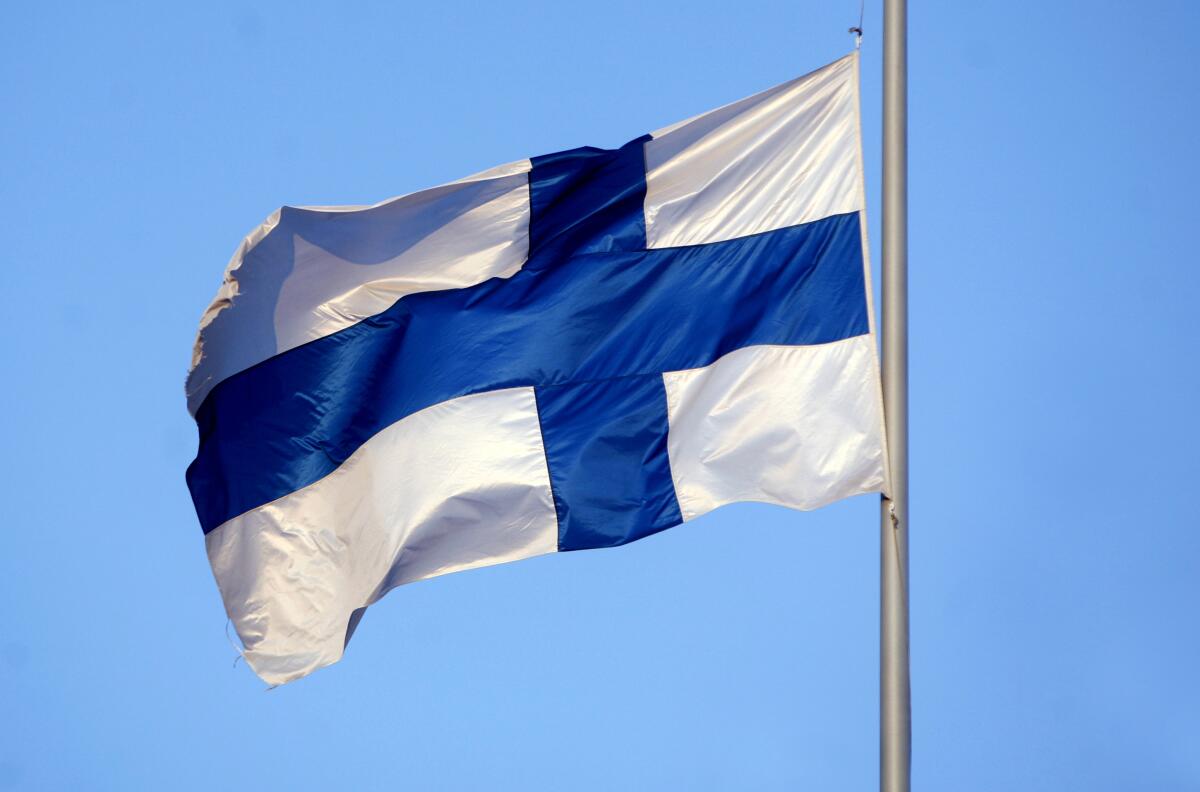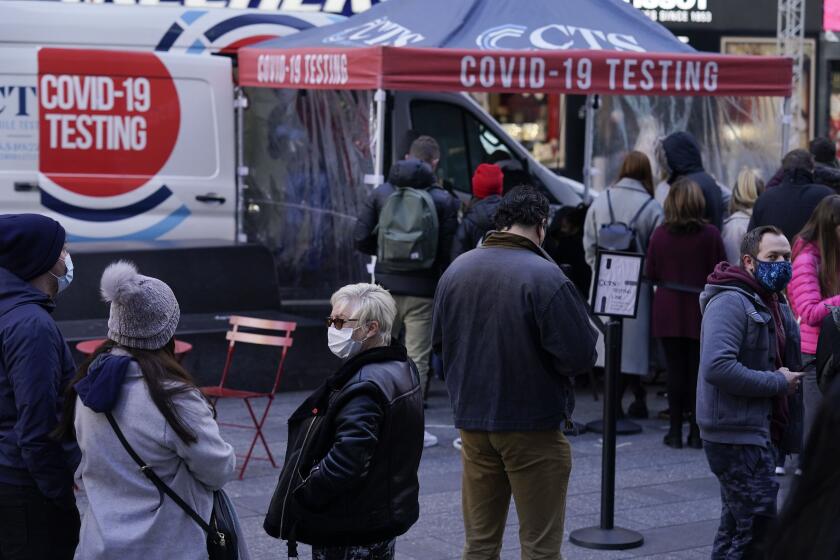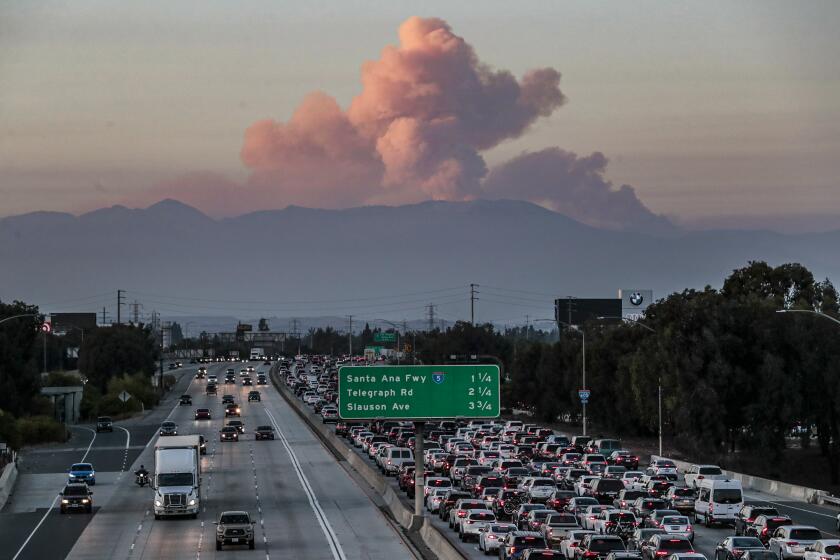Op-Ed: Finns are happy; Americans aren’t. What’s Finland’s secret? Trust

- Share via
In April 2020, two months into the pandemic, my husband, Niko, and I decamped to Helsinki. At the time, I thought it was a terrible idea. We were swapping life in an idyllic Marin County cottage for Finland, where the explosion of coronavirus infections had led the government to declare a state of emergency for only the second time in the country’s history. Helsinki, where the infection rate was highest, was cordoned off from the rest of the country.
But necessity compelled. Niko, who is Finnish, is a startup co-founder, and he needed to be in Helsinki to keep the enterprise afloat. Because I’m a permanent Finnish resident, the equivalent of a green card holder, I can stay indefinitely, and so off we went.
That move turned out to be the smartest thing we could have done. Not only did it insulate us from the worst of the pandemic’s predations, it also distanced us from the fever dream of discontent that has gripped America since early 2020, reminding us about the incalculable importance of trust.
We spent the gray month of that April barricaded in our Helsinki apartment, but our self-imposed isolation proved remarkably brief. By mid-May, the number of new infections started to decrease. COVID-19 was nearly gone by Midsummer, a national holiday in a country that endures months of near-constant darkness. That summer, public health officials recorded steadily declining numbers of cases — down to single digits a day, in a nation with a population of 5.5 million.
We’re all tired but complacency is the greatest danger in the fight against the pandemic.
Finns joke that the virus decimated Sweden and then hopscotched to Russia. The truth is more mundane — what mattered most was their confidence that the government had their best interests at heart. With the appearance of the Omicron variant, there has been an alarming spike in coronavirus cases there, schools closed early for the Christmas break and other restrictions have been put into place, but no one is attacking the government or whaling on one another. According to the Finnish Institute for Health and Wellness, more than 80% of the country’s eligible population is fully vaccinated.
Finland consistently ranks at or near the top in international surveys comparing levels of people’s trust in their institutions, such as the police and the legal system, the government and the media.
For the past three years, the country has been coronated as the world’s happiest nation — and not in the laugh-out-loud sense. In Finland (and the other Nordic countries, which also rank high in happiness), there is “a virtuous cycle, where well-functioning and democratic institutions are able to provide citizens extensive benefits and security, so that citizens trust institutions and each other,” the United Nations Sustainable Development Solutions Network, which conducted the survey, pointed out in 2020. “Fixing rather than fighting becomes the order of the day.”
When, at the outset of the pandemic, Finland’s leaders declared that COVID was an existential threat, people believed it. During the Helsinki blockade, more than 90% of the country approved of how President Sauli Niinistö was doing his job, and Prime Minister Sanna Marin’s approval rate was nearly as high.
Finns Purelled their hands and flocked to get tested. They are famously introverted — people stand as far from one another as humanly possible while waiting for a tram — and so social distancing came naturally. May Day, known as Vappu, is usually a time to let loose, but when the prime minister called upon her compatriots to stay home and celebrate “virtual Vappu,” people followed her lead.
Living in this republic of reasonableness most of the time since the outbreak of the pandemic, we felt safe.
I’m a Northern Californian but I find myself inching toward a status I never dreamed of: expat.
In the United States, by sharp contrast, trust in public institutions has fallen off the charts. In the 1950s, according to the Pew Research Center, three-quarters of Americans said they could trust the government to do what is right, but today only a quarter share that belief. In a Morning Consult poll in 2020, Amazon and Google were the country’s third- and fourth-most trusted institutions, after “your primary doctor” and the military. Washington was about as popular as stinkweed.
To our Finnish friends, the drumbeat of COVID news from the U.S. — where wearing a mask or getting vaccinated became politically freighted decisions, red state versus blue state; where Donald Trump laughed off the threat and slammed public health officials who kept telling him otherwise — was so incomprehensible that it might as well have been beamed from another planet. Our friends couldn’t understand what liberty, the battle cry of the antis, had to do with wearing a mask or getting vaccinated. “Don’t people feel any obligation to one another?” they asked, and I didn’t have a decent answer.
Living in Helsinki has been a constant reminder that a people and a nation don’t have to behave as Americans have been behaving. I have started to see the U.S. through the lens of a Finn. It is not a pretty sight.
Finns trust their government because they know that it has their back. But why should Americans believe in institutions that do precious little for them? Legislation backed by a majority of the citizenry goes nowhere in Congress, which is consumed by political grandstanding and obstructionism. Public health efforts suffer from slash-and-burn budget cuts. Compared with Finland, the U.S. has little to no safety net to cushion a crisis. People living on the edge here believe — and rightly so — that they are on their own. Instead of a we’re-in-this-together commitment to the common good, we’re trapped in toxic “us versus them” battles.
In 2019, the Pew Research Center found that most Americans believed a prevailing lack of trust made it harder to solve the nation’s problems. Sixty-eight percent said it was very important to repair the public’s level of confidence in the federal government and 58% said the same about improving the level of confidence in fellow Americans.
Recent events are hardly cause for optimism, but the bottom line is simple — this repair work must be done if our democracy is going to survive.
David Kirp, a public policy professor at UC Berkeley, divides his time between California and Finland.
More to Read
A cure for the common opinion
Get thought-provoking perspectives with our weekly newsletter.
You may occasionally receive promotional content from the Los Angeles Times.












